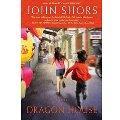In the crowded streets of Ho Chi Minh City, formerly known as Saigon, American friends Iris and Noah try to help homeless children and find a higher calling for their lives. The friends are fictional, characters in John Shors' new novel, Dragon House. But, the problem of homeless children is real, and through his novel, Shors gives readers a chance to help solve it.
American author lived in Asia John Shors was raised in Des Moines, Iowa, far from any Asian influence. But after graduating from college, he spent a number of years in Japan, teaching English and saving money to travel to China, Thailand and beyond. He says that's when he started to fall in love with Asia. "I backpacked around the region for about a year and visited big Asian cities like Bangkok, Saigon [Ho Chi Minh City], Katmandu, Delhi and so forth," he says. "I had wonderful experiences, and I was so enamored with the culture, and the people, the history, the food and the climate. I just love everything about that part of the world. It's very dynamic and full of life." Streets crowded with homeless children It was during those trips, he says, that he noticed the almost constant presence of street children. "Oftentimes these children are born into extreme poverty and their parents literally cannot afford to keep them," he says. "So they just abandon them. Or a family might be torn apart by drugs, or perhaps the parents have been killed. There is not the support system to take care of these children. So the children are out on the streets, at 5, 6, 7, 8, 9, 10 years old, having to support themselves," Shors says. Survival tactics inspire characters in novel Shors spent time talking and interacting with those kids, and says he couldn't help but admire them. "These homeless children were out hustling - selling fans, post cards, flowers at all hours of night and day to tourists," he says. "What impressed me about these kids is that they were incredible little entrepreneurs. They were not sitting on the corner with their hands out, they are hustling. If it's raining, they are selling umbrellas. If it's hot, they were selling Coca Colas. They are just amazingly resilient, witty and intelligent and hopeful kids. Every night in Thailand, I played 'Connect Four' with a little 7 or 8-year old boy. He would carry this game around with him and play tourists for a dollar a game. That's how he lived. I was so amazed by this little boy. He was brilliant." That little boy inspired one of the characters in Dragon House , Shors' new novel. Most of the action takes place in Vietnam.
"I was lucky enough to go to Vietnam three times," he says. "There is definitely still a legacy of war there. There are still thousands and thousands of unexploded bombs in the jungle that blow up when kids run over them. So there are a lot of legless children, farmers and so forth. But having said that, I think the Vietnamese people themselves have really kind of moved beyond the war. It's a country that is full of hope and optimism and energy. I was welcomed with open arms as an American," Shors says. Premise includes Vietnam, Iraq war veterans The book opens with Iris, the main character, preparing to go to Vietnam on a personal mission. "Her father is a Vietnam vet. He goes back to Vietnam to try to open this center to house and educate Vietnamese street kids," he explains. "He actually gets very, very sick, and at the beginning of the book, he is dying. Iris promises him that she is going to go to Vietnam to fulfill his dream, to open this center. Just as she is about to leave, she meets her childhood friend Noah, who had returned from the war in Iraq about 5 months earlier, where he lost part of his leg. He has a great deal of angst over that, and sorrow and misery and anger. He decides to go with her to Vietnam, not really thinking that's going to help him, but he doesn't have anything better to do," Shors says. Connecting with the homeless kids on a very personal level brings a sense of satisfaction and hope to the lives of the two friends, especially Noah.
"Even though Noah has all this grief and resentment towards the war in Iraq, he starts to move past it, because he realizes that these children have it harder than he does," he says. "He ends up really putting himself in additional risk, in additional danger to try to help out these children." Some profits will benefit homeless kids in Vietnam Like the characters in his novel, Shors decided to help street children in reality. He encourages his readers to help too.
"I'm donating a percent of the royalties, of the proceeds from Dragon House to the Blue Dragon Children Foundation, a group in Vietnam that actually supports children," he says. "I partnered with this group, and if any of your listeners are interested, they can go to my web site, which is www.dragonhousebook.com and learn about the charity I'm helping. It's wonderful! My novel Dragon House has only been out for a short time now, but we've already raised enough money to help about 250 Vietnamese street kids." Dragon House is John Shors' third novel inspired by his Asian journeys. He says he hopes readers will enjoy reading it and come to the conclusion that, whether in the West or the East, people are more alike than different.

